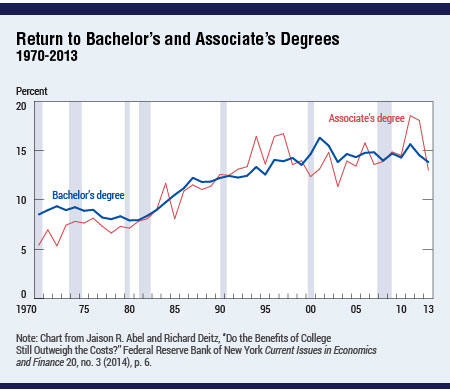
Students in recent years have been paying more to attend college and earning less upon graduation—trends that have raised questions about whether a college education remains a good investment. However, in recent work, economists Jaison Abel and Richard Deitz find that the benefits of college still tend to outweigh the costs.
In Current Issues in Economics and Finance:
Do the Benefits of College Still Outweigh the Costs? estimates that the return to a bachelor’s degree averaged about 9 percent during the 1970s, then nearly doubled to about 16 percent by 2001, and has stayed at about 14 to 15 percent for the past decade. The authors argue that the return remains high in spite of rising tuition and falling earnings because the wages of those without a college degree have also been falling.

On Liberty Street Economics:
The Value of a College Degree finds the net present value of a bachelor’s degree for the average graduate has held near its all-time high of about $300,000 for more than a decade.
Staying in College Longer Than Four Years Costs More Than You Might Think shows how much the return to a degree falls as time to completion increases.
College May Not Pay Off for Everyone presents analysis showing that about a quarter of college graduates don’t earn wages much above those with just a high school diploma.
Are the Job Prospects of Recent College Graduates Improving? examines trends in unemployment and underemployment for those just out of school.











